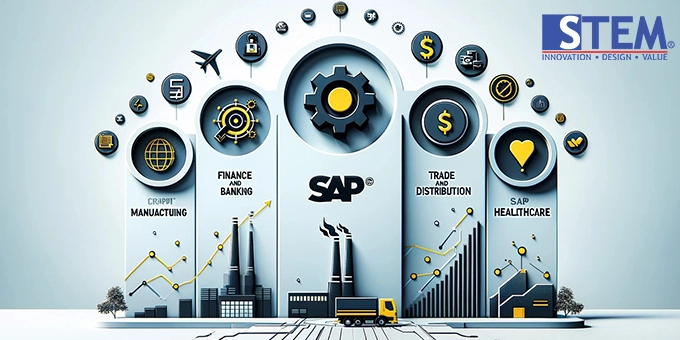The SAP system is one of the world’s leading enterprise management software solutions. Developed by the German technology company SAP SE, this system has become a premier solution, helping businesses manage various operational aspects.
With its advanced integrated architecture, SAP provides a robust platform for automating business processes, managing information, and integrating key functions such as finance, supply chain, human resources, sales, and more.
The SAP system is renowned not only for its reliability in managing business operations but also for its ability to deliver scalable solutions tailored to the specific needs of each company.
This makes SAP the top choice application for many businesses, from small enterprises to multinational corporations, seeking to enhance efficiency, visibility, and innovation in their operations.
In this article, we will explore the core components of the SAP system and understand how it offers significant benefits to modern businesses.
Let’s begin by taking a closer look at what makes the SAP system so essential in the rapidly evolving world of business.
Key Components of the SAP System
The SAP system comprises several key components that work together to create a comprehensive and integrated solution for enterprise management.
Here are some of the core components that form the foundation of the SAP system:
- SAP ERP (Enterprise Resource Planning): The heart of the SAP system, SAP ERP provides various functional modules covering different aspects of business such as finance, human resources, supply chain, sales, and distribution. These modules work in unison to offer an integrated platform for managing end-to-end business processes.
- SAP CRM (Customer Relationship Management): Focusing on customer relationship management, SAP CRM helps businesses understand and interact with their customers more effectively. It includes functions such as sales management, marketing, customer service, and behavioral analysis.
- SAP SCM (Supply Chain Management): SAP SCM optimizes a company’s supply chain, providing greater visibility into logistics processes, inventory management, production planning, and collaboration with supply chain partners.
- SAP SRM (Supplier Relationship Management): SAP SRM focuses on supplier relationships, assisting companies with procurement, contract negotiations, and collaboration with suppliers to enhance efficiency and reduce costs.
- SAP BW/BI (Business Warehouse/Business Intelligence): SAP BW/BI gathers, stores, and analyzes business data, providing valuable insights for better decision-making. It includes functions like reporting, data analysis, and predictive modeling.
Through this powerful combination of modules, the SAP system offers a comprehensive platform to manage various aspects of business efficiently and effectively. In this article, we will further explore the benefits that the SAP system provides to modern enterprises.

Benefits of SAP for Modern Businesses
SAP delivers a range of substantial benefits to modern businesses, helping them improve operational efficiency, optimize performance, and achieve their business objectives more effectively.
Here are some of the key benefits that SAP offers:
a. Enhanced Operational Efficiency
With its strong integration of various functional modules, SAP automates business processes, reducing reliance on manual labor and eliminating data silos between departments. This allows companies to allocate resources more efficiently and boost overall productivity.
b. Improved Integration Between Departments and Business Processes
SAP provides a unified platform to manage different operational aspects, from finance to supply chain and human resources. This ensures better and faster information flow between departments, enabling improved collaboration and decision-making.
c. Faster and Better Decision-Making
With access to real-time data and advanced analytics tools, SAP provides businesses with valuable insights to make faster and more informed decisions. Predictive analysis and comprehensive reports help stakeholders identify trends, seize opportunities, and respond to market changes more effectively.
d. Scalability for Business Growth
SAP is designed to grow alongside your business. With high flexibility and scalability, it can be tailored to your current needs and expanded or adjusted as your business grows and evolves.
e. Accurate Real-Time Data Availability
With access to accurate, real-time data, companies can make more timely decisions based on the latest information. This improves responsiveness to market changes and enables faster reactions to both opportunities and challenges.
Given these benefits, it’s no surprise that SAP has become the top choice for many businesses worldwide, seeking to improve efficiency, productivity, and competitiveness in today’s modern business environment.

Examples of SAP Usage Across Various Industries
SAP has proven to be a highly adaptable and customizable solution, applicable across various industries to optimize business operations. Below are some examples of SAP’s use in different sectors:
1. Manufacturing
In manufacturing, SAP can be used to manage supply chains, plan production, control inventory, and optimize overall plant performance. With strong integration between production, procurement, and distribution departments, manufacturers can enhance operational efficiency and reduce production costs.
2. Finance and Banking
In the financial and banking sectors, SAP can manage financial transactions, monitor risks, and ensure regulatory compliance. By integrating finance, risk management, and compliance modules, financial institutions can improve risk management, enhance compliance, and offer better customer service.
3. Trade and Distribution
In the trade and distribution industry, SAP helps manage inventory, plan deliveries, and optimize distribution networks. Through strong integration of sales, distribution, and warehouse management modules, trading companies can improve supply chain visibility, reduce logistics costs, and enhance customer service.
4. Professional Services
In the professional services sector, SAP manages projects, human resources, and staff performance optimization. With strong integration between project management, HR, and finance modules, professional service firms can increase operational efficiency, maximize resource utilization, and improve customer satisfaction.
5. Healthcare
In the healthcare industry, SAP helps manage patient information, care planning, and inventory of medical supplies and equipment. By integrating electronic medical records, patient management, and asset management modules, hospitals and other healthcare institutions can enhance operational efficiency and improve patient care quality.
These examples demonstrate SAP’s wide-ranging applications and its ability to add significant value across industries.
Conclusion
In the rapidly evolving world of business, a company’s success often depends on its ability to adapt to changes and make timely decisions based on accurate data.
With SAP, businesses have a powerful, integrated solution for managing various operational aspects more efficiently and effectively.
By enabling strong integration between different functional modules, SAP helps companies automate business processes, improve visibility and collaboration between departments, and make better decisions based on enhanced data insights.
With high flexibility and scalability, SAP can be customized to meet the specific needs of each company and grow alongside the business.
Given its benefits—such as enhanced operational efficiency, improved department integration, better and faster decision-making, and access to accurate real-time data—it’s no wonder that SAP is the preferred choice for many companies worldwide seeking to enhance their competitiveness in the modern business landscape.
Additionally, SAP’s commitment to security makes it a trusted platform for businesses concerned about protecting sensitive business data from ever-evolving cybersecurity threats.
So, if you are considering upgrading your business technology and looking for a solution that can deliver significant added value, SAP should be at the top of your list.
With its proven ability to optimize business operations and drive digital transformation, SAP is an investment that can propel your company to the next level.
Contact us at PT. Sterling Tulus Cemerlang if you are interested in implementing SAP in your organization.



